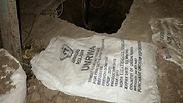
Terror tunnels, embargoes and human rights
Op-ed: Hundreds of rockets fired into Israel and discovery of dozens of underground Gaza tunnels have completely undercut NGOs' narrative, yet they continue to ignore these inconvenient facts.
In addition to machine guns and antitank missiles, the terrorists were armed with syringes and handcuffs, apparently in an attempt to abduct Israeli soldiers or civilians. The IDF also prevented what could have been a murderous rampage in an Israeli kibbutz near the Gaza border. Luckily in that incident, 13 terrorists were detected immediately and neutralized as they emerged from a tunnel.
With the commencement of the ground incursion by IDF land forces, dozens of tunnels have been discovered leading into Israel. Many were dug in preparation for an anticipated Israeli attack in order to ambush Israeli soldiers from beneath.
The discovery of a terror tunnel network running from Gaza into Israel and under Gaza itself should cause NGOs (non-governmental organizations) and their European government funders to rethink their ongoing campaigns against Israel’s policies towards Gaza.
For years, Gisha (funded by the UK, Ireland, the EU, Norway and other governments), Oxfam (funded by the UK, EU and other governments), Amnesty International, Human Rights Watch (HRW) and many other political advocacy NGOs have conducted an ongoing campaign condemning Israel for maintaining restrictions on construction materials and other goods entering Gaza.
These NGOs falsely assert that the restriction constitutes "collective punishment" and claim that any security rationale is merely a pretext.
Amnesty, for instance, said in 2013 that the "blockade" of Gaza caused a "massive denial of rights," while Oxfam asserted that it causes "a protracted human tragedy" and is "in violation of international law." HRW and Gisha both claimed in 2013 and 2014 that the closure is "punitive" in nature. At the same time, any condemnation of rocket fire into Israel is minimal to non-existent.
These NGOs have also repeatedly dismissed Israel’s security concerns about "dual-use" goods (materials that could be used for either civilian purposes or terror, i.e. cement for tunnels and metal pipes for rockets). Their claims were quickly adopted by European governments, which in turn have been pressuring Israel to change its policy and ease the closure of Gaza.
Now, the hundreds of rockets fired into Israel, as well as the discovery of tunnels under Gaza and into Israel, have completely undercut the NGO narrative. Despite security concerns, Israel had eased most restrictions on imports into Gaza, and allowed limited exports through Israel as well.
These measures, however, were not reciprocated. Instead of improving the lives of Gaza’s residents, Hamas and the Islamic Jihad continued to bring in weapons from Iran, Syria, and Libya with the explicit aim of terrorizing and murdering Israeli civilians. As Israeli civilians sit hunkered down in bomb shelters, the need for the Israeli closure is stronger than ever.
Likewise, the tunnels, extremely complex engineering operations, were built with hundreds of tons of concrete and hours of labor that could have been used to build schools, medical facilities, and houses. The concrete could also have been used to construct bomb-shelters for Gaza civilians, similar to the ones constructed in buildings and neighborhoods throughout Israel.
Instead, the construction materials were diverted toward attempted terror attacks against Israel and to prepare for an Israeli ground incursion, which Hamas inevitably provoked through incessant rocket fire.
The network of intensely ideological NGOs, though, ignores these inconvenient facts.
Instead they have escalated their anti-Israel campaigns. Amnesty International has reinitiated its call for an arms embargo against Israel, with special attention paid to weapons that Israel receives from the United States.
To be sure, Amnesty also calls for an arms embargo against "Hamas and Palestinian armed groups." However, as noted above, Amnesty has been actively frustrating such an embargo for years, condemning Israel’s attempt to do just that through the closure of Gaza. Furthermore, Amnesty was silent about Hamas’ illicit weapons pipeline as long as Israel did not respond militarily, reflecting the NGO’s real agenda and the illusion of balance.
When NGOs pressured Israel to ease its blockade, they falsely claimed that a legitimate defensive, less invasive measure constitutes "collective punishment." In ignoring Hamas’ misuse of materials and exploitation of the eased blockade, these groups were extremely naïve. But, when coupled with antagonistic rhetoric toward Israel, it was more likely is an expression of a malicious anti-Israel agenda.
Josh Bacon is head of Israel Desk at NGO Monitor, a Jerusalem-based research institute.










